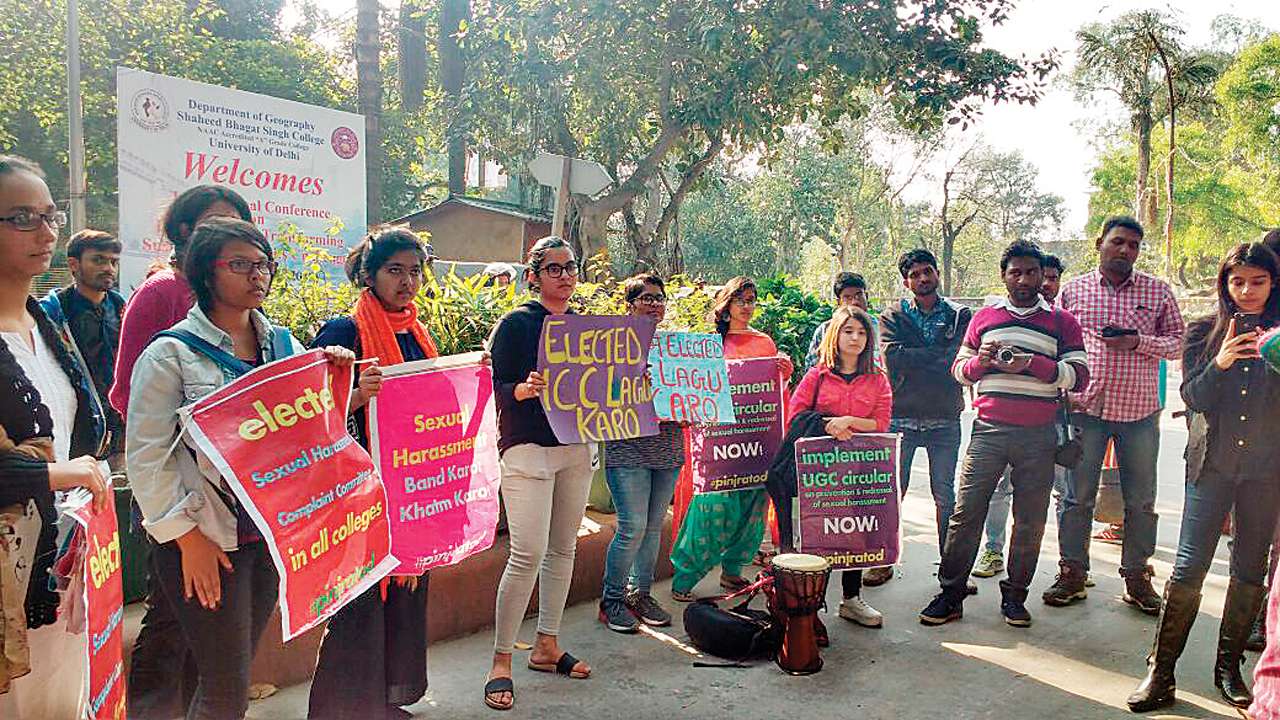The official redressal mechanism provided to college students to combat sexual harassment, assault, intimidation, etc. is the Internal Complaints Committee (ICC). The committee comprises of elected members from the faculty, student body, as well as external members, and holds enquiries on sexual harassment cases to decide on the appropriate punishment. The ICC, in its structure and function, is one of the most important bodies in the college administration. But in most cases across Indian campuses, it is either absent, non-functional, or even if it is there, a chunk of students lack the awareness about it.
Therefore, to thoroughly boost ICC’s presence and importance in the public domain is imperative on the part of the administration. An orientation about the ICC is legally mandated by the University Grants Commission (Prevention, Prohibition, and Redressal of sexual harassment of women employees and students in higher education institutions) Regulations, 2015. The Regulation states in 3(c) that the ICC must “organize training programmes…for faculty and students…to sensitize them and ensure knowledge and awareness of the rights, entitlements and responsibilities enshrined in the Act and under these Regulations.”
The ICC, in its structure and function, is one of the most important bodies in the college administration
Despite this, what transpired in Ramjas College on 27th August 2018 can be seen as an example of one of the various ways administrations deliberately make the implementation of progressive and critical initiatives difficult. In a historic moment for the college, the ICC held its first ever orientation aimed towards increasing awareness about the committee and sensitivity towards the issue of sexual harassment. The first round, meant for third year students, took place as per schedule, only to come to a standstill right after its conclusion.
The statement issued by Ramjas students describes the orientation. “This year’s orientation comprised of a detailed introduction about the ICC, followed by college students taking the stage and courageously talking about the pervasiveness of sexual harassment with reference to their own personal experiences. Conversations about the complex nature of sexual harassment and around questions of consent, abuse, mental health, power, and masculinity were initiated through students’ accounts. These narratives, powerful and unprecedented in the openness of their public airing, represented a successful attempt at spreading awareness about, and sensitization towards the multiple ways in which sexual harassment is present in our everyday lives at college.”
Two weeks of preparation and hard work by students and teachers could be seen as the orientation was a massive success, receiving positive feedback from students, many for which this orientation was an eye-opener. The second round of the orientation, meant for first and second year students, was to be held on 28th August, following the same pattern of information and conversation. But within an hour of wrapping up with the event, the ICC chairperson of Ramjas College was informed through a phone call that the next round of the orientation stands postponed, without a final date for the same.
An orientation about the ICC is legally mandated by the University Grants Commission Regulations, 2015
This arbitrary step taken by the college administration raises numerous concerns, and reveals much about structural hindrances students often face while attempting to bring, or even talk about reform.
The nature of the decision lacks accountability and transparency. Most importantly, the refusal to provide a reason or a future date of the postponement in the official notice is blatant show of arbitrariness and denial of responsibility towards legally mandated decisions. The increasing support by the state which is being given to college administrations in various cases of arbitrariness, like cancelling student gatherings which also happened recently in Ramjas, is adding on to the diminishing spaces in university essentially made for critical thinking and engaging in conversations. Additionally, the hollow urgency reflected in this decision is incoherent with the fact that such an event is mandated by law.
The callous approach taken by the administration towards this event also speaks volumes about its unwillingness to provide a platform on which ‘uncomfortable’ questions and concerns can be raised. A mere phone call and a non-informational notice is reveals the indifferent and careless attitude towards the issue of sexual harassment. The lack of consideration of vulnerable students is highly insensitive, to say the least.
A mere phone call and a non-informational notice is reveals the indifferent and careless attitude towards the issue of sexual harassment
Another major conspicuous aspect is regarding the schedule of the orientation. The statement says, “Considering the rampant nature of sexual harassment on campus, the urgency of addressing this issue should be self-evident. It needs to be emphasised that the original schedule for the orientation was prepared keeping in mind the need for students to think seriously about the gravity of this problem, especially at this particular time in the semester, when DU is in the throes of the run-up to the DUSU elections, which unfortunately and ironically, create an open environment for the practice of all manner of sexual harassment offences.”
This incident reveals a lot about how progressing towards change is a constant struggle for students across India. In recent times, they have become the target of the state and the system, and continuous attempts to curb their voice of criticism are made. Bringing such a crucial initiative about a rampant and highly sensitive issue to a standstill, along with the college administration choosing to act arbitrarily, stands evidence to the growing attack on the essence of higher education and hostility towards students.
Also read: Despite UGC Mandate, DU Seems To Be Neglecting Grievance Redressal | #MakeMyCampusSafe
Featured Image Source: DNA India




